
Uncle Meat is the sixth album by the Mothers of Invention, and seventh overall by Frank Zappa, released as a double album in 1969. Uncle Meat was originally developed as a part of No Commercial Potential, a project which spawned three other albums sharing a conceptual connection: We're Only in It for the Money, Lumpy Gravy and Cruising with Ruben & the Jets.

Hot Rats is the second solo album by Frank Zappa, released in October 1969. It was Zappa's first recording project after the dissolution of the original version of the Mothers of Invention. Five of the six songs are instrumental, while "Willie the Pimp" features vocals by Captain Beefheart. In his original sleeve notes, Zappa described the album as "a movie for your ears".

Apostrophe (') is the sixth solo album and eighteenth in total by Frank Zappa, released in March 1974 in both stereo and quadraphonic formats. An edited version of its lead-off track, "Don't Eat the Yellow Snow", was the first of Zappa's three Billboard Top 100 hits, ultimately peaking at number 86. The album itself became the biggest commercial success of Zappa's career, reaching number 10 on the US Billboard 200.

Burnt Weeny Sandwich is the seventh album by the American rock band the Mothers of Invention, and the ninth overall by Frank Zappa, released in 1970. It consists of both studio and live recordings. Following the Mothers' split in late 1969, Zappa assembled two albums of unreleased recordings by the band - this album and its follow-up Weasels Ripped My Flesh. Burnt Weeny Sandwich focuses mostly on studio recordings and tightly arranged compositions, while Weasels Ripped My Flesh focuses mostly on live recordings and loose/improvisational pieces. Both albums also include some outtakes/leftovers from the sessions for Zappa's 1969 solo album Hot Rats.

Jazz from Hell is an instrumental album whose selections were all composed and recorded by American musician Frank Zappa. It was released on November 15, 1986, by Barking Pumpkin Records on vinyl and cassette, and in 1987 by Rykodisc on CD.

Thing-Fish is an album by Frank Zappa, originally released as a triple album box set on Barking Pumpkin Records in 1984. It was billed as a cast recording for a proposed musical of the same name, which was ultimately not produced by Zappa, but later performed partially in 2003, ten years after his death.

Roxy & Elsewhere is a double live album by Frank Zappa and The Mothers, released on September 10, 1974. Most of the songs were recorded on December 8, 9 and 10, 1973 at The Roxy Theatre in Hollywood, California.
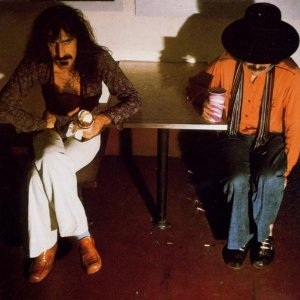
Bongo Fury is a collaborative album by American artists Frank Zappa and the Mothers, with Captain Beefheart, released in October 1975. The live portions were recorded on May 20 and 21, 1975, at the Armadillo World Headquarters in Austin, Texas. Tracks 5, 6 and 9 are studio tracks recorded in January 1975 during the sessions which produced One Size Fits All (1975) and much of Studio Tan (1978).
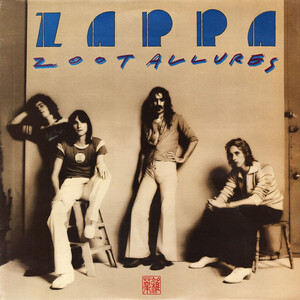
Zoot Allures is the 22nd album by the American rock musician Frank Zappa, released in October 1976 and his only release on the Warner Bros. Records label. Due to a lawsuit with his former manager, Herb Cohen, Zappa's recording contract was temporarily reassigned from DiscReet Records to Warner Bros.

Sleep Dirt is an album by Frank Zappa, released in January 1979 on his own DiscReet Records label, distributed by Warner Bros. Records. It reached No. 175 on the Billboard 200 album chart in the United States.
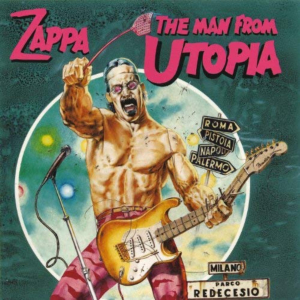
The Man from Utopia is an album by American musician Frank Zappa, released in March 1983 by Barking Pumpkin Records. The album is named after a 1950s song, written by Donald and Doris Woods, which Zappa covers as part of "The Man from Utopia Meets Mary Lou".

Läther is the sixty-fifth official album by Frank Zappa. It was released posthumously as a three-CD set on Rykodisc in 1996. The album's title is derived from bits of comic dialog that link the songs. Zappa also explained that the name is a joke, based on "common bastardized pronunciation of Germanic syllables by the Swiss."
Xenochrony is a studio-based musical technique developed at an unknown date, but possibly as early as the early 1960s, by Frank Zappa, who used it on several albums. Xenochrony is executed by extracting a guitar solo or other musical part from its original context and placing it into a completely different song, to create an unexpected but pleasing effect. He said that this was the only way to achieve some rhythms.

Zappa in New York is a double live album by Frank Zappa released on his own DiscReet Records label, distributed by Warner Bros. Records. It was recorded in December 1976 at a series of concerts at the Palladium in New York City.

Studio Tan is an album by American musician Frank Zappa, released in September 1978 on his own DiscReet Records label, distribued by Warner Bros Records. It reached No. 147 on the Billboard 200 albums chart in the United States.
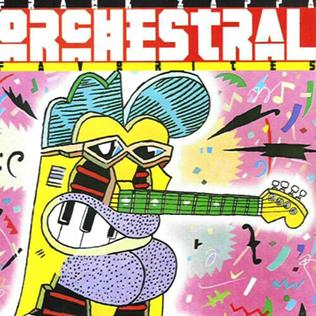
Orchestral Favorites is an album by Frank Zappa, released in May 1979 on his own DiscReet Records label. The album is entirely instrumental and features music performed by the 37-piece Abnuceals Emuukha Electric Symphony Orchestra. It reached No .168 on the Billboard 200 album chart in the United States.

Walk a Mile in My Shoes: The Essential '70s Masters is a five-disc box set compilation of the recorded work of Elvis Presley during the decade of the 1970s. It was released in 1995 by RCA Records, catalog number 66670-2, following similar box sets that covered his musical output in the 1950s and 1960s. This set's initial long-box release included a set of collectable stamps duplicating the record jackets of the LP albums on which the tracks in the box set were originally released by RCA. It also includes a booklet with an extensive session list and discography, as well as a lengthy essay by Dave Marsh, some of it excerpted from his 1982 book on Presley. The box set was certified gold by the Recording Industry Association of America on July 15, 1999.
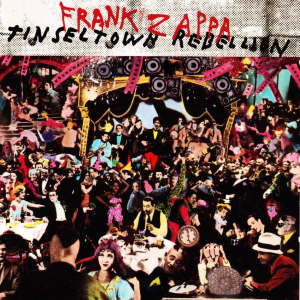
Tinsel Town Rebellion is a double live album released by Frank Zappa in May 1981. The album was conceived by Zappa after he scrapped the planned albums Warts and All and Crush All Boxes, and contains tracks that were intended for those albums.

The Lumpy Money Project/Object is a compilation album by Frank Zappa. Released posthumously on January 23, 2009 as Official Release #85, it compiles the releases Lumpy Gravy and We're Only in It for the Money with previously unreleased material, with the overall package serving as an audio documentary of the production of the two albums, which share conceptual continuity themes. It is project/object #2 in a series of 40th Anniversary FZ Audio Documentaries, following MOFO (2006).

The Old Masters is a box set series by Frank Zappa, released in three volumes on Barking Pumpkin Records from April 1985 to December 1987, consisting of studio and live albums by Zappa and The Mothers of Invention originally released from 1966 to 1976 on other labels, as well as "Mystery Discs" which contained previously unreleased material. The graphics on all three sets was airbrush illustrated by Larry Grossman. 200 Motels was not included in the series as it was the only Zappa/Mothers album for which Zappa was unable to secure the rights.



















